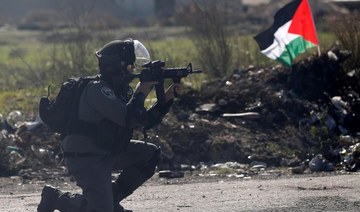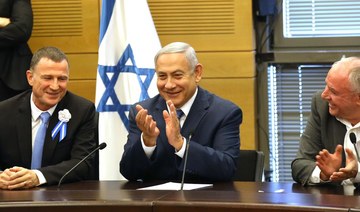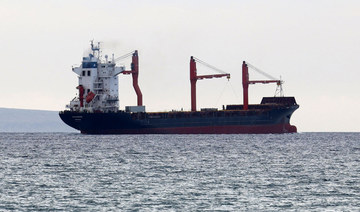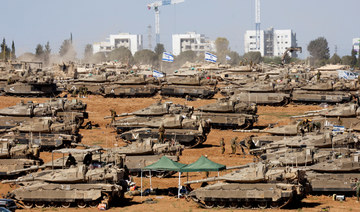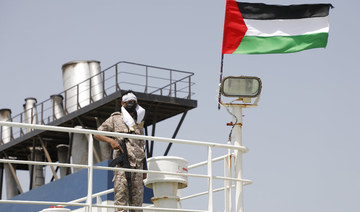JERUSALEM: For 20 years, Hala Kashour has lived with her husband in what she called “paradise,” a bucolic meadow that rolls through a Palestinian neighborhood of east Jerusalem.
The coveted pasture, which Israel calls the “Peace Forest,” lies in the crosshairs of a long-simmering conflict between the city government and its Palestinian residents that flared up on a recent spring morning as Kashour, 47, was jolted awake by the sound of bulldozers crushing her neighbor’s house.
Some 60 houses in the grassy quarter, known to its 500 residents as Wad Yasul, are facing demolition by Israeli authorities. Earlier this month, the Supreme Court declined to hear the residents’ appeal against demolition orders, saying the structures were built without required permits in a municipally designated green space.
“God willing, we won’t be next,” said Kashour, who claims she built the neighborhood’s first house, a stone cottage ringed with rose bushes, on land her family has owned for 50 years.
Demolition of unauthorized Palestinian-owned structures in east Jerusalem is not unusual. The municipality contends it cracks down on zoning violations. Palestinians say it is nearly impossible to receive building permits, and that Israel is severely restricting their ability to build on land they claim for the capital of their future state.
But the Peace Forest demolitions have drawn particular attention because of accelerating construction by a nationalist Jewish organization in the same park.
With the support of Israel’s Tourism Ministry, the City of David Foundation has set up lodging structures, operates a Segway tour through the woodland and is advancing plans for several tourist attractions, including a visitor center and what it bills as the country’s largest zip line. The foundation said it has leased 4% of the park’s total area from the government.
Although city regulations forbid construction of any kind in designated parks, the municipality confirmed it was working to alter zoning restrictions and retroactively authorize City of David’s construction and facilitate its expansion.
“The City of David hasn’t yet received final approval for everything, but its efforts to build up public space with sports and tourist facilities are being considered positively,” said an official in the Jerusalem mayor’s office, who spoke on condition of anonymity because he was not authorized to talk to the media. “We are not eager to evict Palestinian residents in a brutal way, but we have a green light from the highest court.”
Activists and Palestinian residents say the case of the Peace Forest highlights discriminatory Israeli policies that have propelled a housing crisis in overcrowded east Jerusalem.
“The government zoned this area in an intractable way to prevent Palestinian construction, and now we can see the designation being altered to serve Jewish settlement,” said Aviv Tatarsky from Ir Amim, an Israeli group that advocates equality in Jerusalem.
The Supreme Court’s dismissal of the case brought an end to the residents’ costly decade-long legal battle to get their houses, in many cases built decades ago on inherited family land, authorized by Israel.
Structures belonging to two families were destroyed immediately following the decision, and two more homes were demolished on Tuesday. Pending demolition orders for the rest of the area can go into effect at any time, said Zyad Kawar, lawyer for the Palestinian residents.
Many residents view the park zoning as a government ploy to force Palestinians out of east Jerusalem, which Israel considers an indivisible part of its capital.
“They don’t want to give us permits, that’s the bottom line,” said Nasser Burqan, 42, whose cousin owned a house demolished this month. “It’s displacement.”
Israel captured east Jerusalem from Jordan in the 1967 Mideast War and annexed it, a move not internationally recognized. Since then, Israel has boosted the Jewish presence there, building neighborhoods where over 200,000 Jews now live.
The Peace Forest sits in the larger Palestinian neighborhood of Silwan, long a focal point of Jewish settlement for its proximity to some of the world’s most sensitive religious sites in the walled Old City.
The City of David Foundation runs popular archaeological and touristic sites in and around Silwan — spots it emphasizes as centerpieces of ancient Jewish civilization. The foundation says its sites “are situated upon King David’s once lost ancient capital,” referring to the biblical figure who is believed to have conquered the city and established Jewish Jerusalem thousands of years ago.
In the Peace Forest, “the City of David has transformed what was once a derelict crime-ridden site” into a space used freely by the public, said the foundation’s vice president, Doron Spielman. “We are confident that it too will become a major tourist attraction.”
The City of David projects are not planned on the ruins of the demolished homes, and the foundation says the city’s demolition plans go back long before it became involved. But critics say the demolitions on one hand, and the green light to City of David on the other, illustrate two sets of standards for Jews and Palestinians in the city.
The organization has also drawn sharp criticism for helping to settle Jewish families in Arab neighborhoods, fueling suspicions that its tourism projects mask efforts to erase the line between east and west Jerusalem, and with it, hope for an independent Palestinian state.
The two-state dream seems more distant than ever after newly re-elected Prime Minister Benjamin Netanyahu promised on the campaign trail to annex West Bank settlements. He is poised to form a governing coalition with right-wing parties that reject Palestinian sovereignty.
His re-election comes a year after the Trump administration recognized Jerusalem as Israel’s capital and moved the US Embassy to the city. Though Trump says his move does not determine the city’s final status, it was seen by the Palestinians and others as recognizing Israel’s claim to the city, including its eastern sector.
With the Trump administration providing unprecedented support for Israel, there are fears in Jerusalem that the government could step up its pressure on Palestinian residents.
“What’s next? What will we do?” said Kashour, standing in her rose garden among some of the recently evicted children from the neighboring Burqan family. “I don’t have anywhere else.”
As Israeli group expands, Palestinian houses face demolition
As Israeli group expands, Palestinian houses face demolition
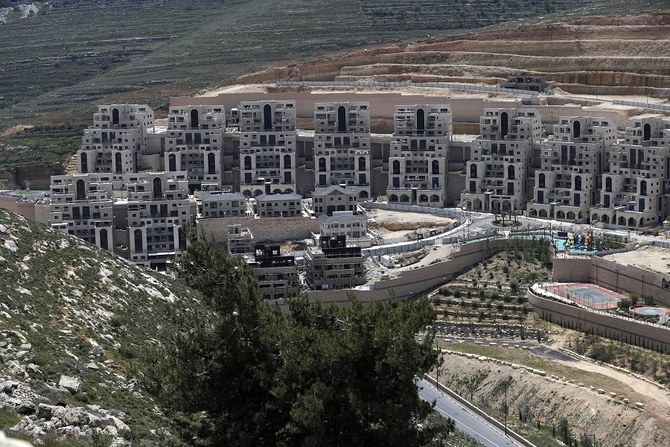
- Some 60 houses in the grassy quarter, known to its 500 residents as Wad Yasul, are facing demolition by Israeli authorities
- The Supreme Court declined to hear the residents’ appeal against demolition orders, saying the structures were built without required permits in a municipally designated green space
Residents cower as fighting picks up in Sudan’s Al-Fashir

CAIRO/DUBAI: Residents are fleeing missile fire and sheltering without food and water amid escalating fighting in the Sudanese city of Al-Fashir, witnesses and aid workers said, adding to fears of an all-out battle.
The city is the Sudanese army’s last stronghold in the western Darfur region. Its capture would be a major boost for the rival Rapid Support Forces (RSF) as regional and international powers try to push the sides to negotiate an end to a 13-month war.
Locals and aid workers fear the clashes could also lead to a new round of bloodletting after ethnically-driven violence blamed on the RSF and its allies elsewhere in Darfur last year.
Many of Al-Fashir’s 1.6 million residents arrived during the violence between Arabs and non-Arabs that killed hundreds of thousands of people in the early-2000s. The RSF’s origins lie in the Arab janjaweed militias accused of ethnic cleansing and genocide then.
In recent weeks the RSF has almost surrounded Al-Fashir, capital of North Darfur state, while soldiers from the army and allied non-Arab armed groups fill the city.
In a sign of mounting ethnic tensions, Mini Minnawi, head of one of the groups, said on X he had made a wide call for fighters to come and defend Al-Fashir, in response to what he said was a similar call by the RSF.
Al-Fashir residents report snipers, stray missiles and army air strikes causing fires in the east and north of the city. Many civilians have taken up arms.
“The situation in the city has been difficult the past few days. Missiles from both sides are falling inside neighborhoods and homes, and getting to hospitals is dangerous,” said 38-year-old resident Hussein Adam.
Medical aid agency MSF said on Thursday that the city’s South Hospital had seen 489 casualties since May 10, including 64 deaths, though it said the real toll was far higher.
Another hospital it supports, which saw 27 people killed last weekend, was forced to shut down after an army air strike 50 meters away, MSF said.
The RSF and army blame each other for the violence.
On Wednesday, the United States imposed sanctions on two top RSF commanders, including the force’s head of operations, for the attacks on Al-Fashir.
“We are prepared to take further action against those who actively escalate this war – including any offensive actions on El Fasher – create barriers to humanitarian access, or commit atrocities,” US ambassador to the United Nations Linda Thomas-Greenfield posted on X.
Experts have raised warnings of impending famine in the displacement camps that dot Al-Fashir. The city also suffers from water shortages, network outages, and high prices.
In one of those camps, Abu Shouk in the north of the city, nine people were killed by stray missiles, camp leaders said on Sunday.
Residents say displaced people from eastern neighborhoods are sheltering under trees and in open squares.
“Most families have moved west, women and children with nothing to eat or drink,” said resident Mohamed Jamal, a volunteer with the local emergency response room.
The army has so far insisted that international aid delivered via Chad for other parts of Darfur pass through Al-Fashir, something that the escalating violence prevents.
Carl Skau, Chief Operating Officer of the World Food Programme, said the agency had trucks ready in the Chadian border town of Tina, but they needed to be able to move soon.
“The window is closing, the rains are coming and we need action in the next couple of weeks,” he told Reuters after a trip to Port Sudan where he tried to negotiate with the army for better access this week.
The UN’s World Food Programme expects more people are being driven to the brink of starvation in other parts of Sudan worst affected by the war including the capital Khartoum, El Gezira state and the Kordofan regions.
“We really need to step up a concerted effort to avoid an even worse catastrophe,” Skau said.
US military says aid pier anchored to Gaza beach

- The US Central Command said the pier was “successfully affixed to the beach in Gaza” with around 500 tons of aid expected to enter the Palestinian territory in the coming days
- “It’s a pretty substantial amount, and it’s spread out over multiple ships right now,” Vice Admiral Brad Cooper, deputy CENTCOM commander, told reporters
JERUSALEM: US troops on Thursday anchored a long-awaited temporary pier aimed at ramping up emergency aid to a beach in the war-ravaged Gaza Strip, the US military and Israel said.
The US Central Command said the pier was “successfully affixed to the beach in Gaza” with around 500 tons of aid expected to enter the Palestinian territory in the coming days.
“It’s a pretty substantial amount, and it’s spread out over multiple ships right now,” Vice Admiral Brad Cooper, deputy CENTCOM commander, told reporters in Washington.
Israel’s military also said in a statement that the connection was “successfully completed.”
But Farhan Haq, a spokesman for UN Secretary-General Antonio Guterres, said negotiations remained ongoing on distribution of the aid — particularly on the safety of workers.
“We are finalizing our operational plans to make sure that we’re ready to handle it once the floating dock is properly functioning, while ensuring the safety of our staff,” he said.
The Gaza war has been devastating for aid workers. The UN agency for Palestinian refugees, UNRWA, which Israel accuses of bias, has alone lost 188 Gaza staff, according to UN figures.
Asked about the concerns, State Department spokesman Vedant Patel said the United States was working with the United Nations on practicalities but added: “From our point of view, we believe that this is ready to go and for aid to start flowing as soon as possible.”
US President Joe Biden announced the emergency pier in March to address the humanitarian crisis in Gaza, where the United Nations has warned of famine with virtually the entire population of 2.4 million displaced by the Israeli military action in response to the October 7 Hamas attack.
Built at a cost of at least $320 million, the project is extraordinary in that such massive humanitarian efforts by the United States are usually in response to actions by hostile countries, not a US ally.
The humanitarian assistance is being screened in Cyprus and loaded by truck. Once on land, it will “move quickly,” being offloaded from the coast into Gaza within hours, Cooper said, adding that “thousands of tons of aid are in the pipeline.”
He said that around 1,000 US soldiers and sailors were involved in the operation but that they would not take part in delivery, which will be led by the UN.
The war began after Hamas’s October 7 attack on southern Israel, which resulted in the deaths of more than 1,170 people, mostly civilians, according to an AFP tally of Israeli official figures.
Israel’s military retaliation has killed at least 35,272 people, also mostly civilians, according to the health ministry in the Hamas-run Gaza Strip.
The UN has argued that opening up land crossing points and allowing more trucks convoys into Gaza is the only way to stem the spiralling humanitarian crisis.
But the primary crossing into Gaza, on the territory’s border with Egypt, has been closed for days.
Israeli troops took over the Palestinian side of the crossing last week as the military threatened a wider assault on the southern city, defying warnings from the United States and others over the fate of some 1.4 million civilians who had been sheltering there.
“Of course we’re thankful to the US for all the work they’ve done in creating the floating dock. However, getting aid to people in need into and across Gaza cannot and should not depend on a floating dock far from where needs are most acute,” Haq said.
Cyprus, the Mediterranean island nation that is the departure point for aid on the planned maritime corridor, said US ship James A. Loux left Wednesday, carrying relief supplies and technical equipment.
Government spokesman Konstantinos Letymbiotis said that “new departures are expected, transporting humanitarian aid including food items, medical supplies, hygiene and temporary shelter.”
Britain, meanwhile, said its initial contribution of nearly 100 tons of “shelter coverage kits” figured in the first shipment.
The pier will begin with facilitating the delivery of around 90 truckloads of international aid into Gaza each day, before volumes are scaled up to 150 truckloads daily, a British statement said.
‘Our supplies will not last,’ warns doctor at trauma center

JERUSALEM: At a field hospital that has become one of Gaza’s leading trauma centers, a doctor who has worked in a dozen war zones described the situation as the most “catastrophic” he had ever seen.
“It is devastating,” said Javed Ali, the head of International Medical Corps’ emergency response in Gaza.
Speaking this week from a field hospital northwest of the areas of Rafah ordered evacuated by Israel, he said the situation around the far southern city was “dire.”
The hospital, in the coastal area of Al-Mawasi, which Israel has designated a “humanitarian zone,” has swelled in a matter of months into a more than 150-bed facility made up of numerous white tents and shipping containers.
Since the first evacuation orders for Rafah were issued on May 6, ahead of a long-feared ground invasion of the southernmost part of Gaza, nearly half of the 1.4 million people who had been sheltering there have left, according to UN agencies.
“There has been a massive population movement,” Ali said, adding that most had avoided Al-Mawasi, which was already dramatically overcrowded, heading instead for the war-scarred city of Khan Younis, a battleground until last month.
Those arriving were “exhausted, they are scared, they don’t have resources,” Ali said, adding that many patients were asking for “money, support ... so they can move their families to safety.”
Gaza’s bloodiest war began with Hamas’s unprecedented Oct. 7 attack on Israel.
Israel’s retaliatory offensive has killed more than 35,000 people in Gaza, mostly civilians, according to the territory’s Health Ministry.
While the number of people sheltering in Al-Mawasi’s sea of tents may not have grown much in recent weeks, the pressure on the field hospital there certainly has.
With access to hospitals in Rafah largely cut off, the facility has seen the number of daily visits to its emergency department balloon from around 110 to close to 300, Ali said, describing “polytrauma cases with broken bones in every part of the body.”
The situation has been exacerbated by last week’s temporary closure of two major aid crossings into Rafah, which disrupted the supply of medicines and fuel for hospital generators.
Ali said the field hospital “saw this coming” and prepared surplus stocks but had not predicted the surging number of patients.
“It’s getting totally out of hand,” he said. “Our supplies will not last.”
He said the field hospital already saw shortages of “very critical items.”
It had, for instance, run out of “all pediatric formulations of antibiotics and painkillers” at a time when around 20 children were recovering from surgery.
Ali said the biggest worry was “space,” with major surgeries doubling from the previous average of around 25 a day.
There has also been a dramatic rise in the workload of the maternity ward, which has gone from around 10 deliveries a day to about 25, along with up to eight C-sections.
With expectant mothers unable to access the specialist maternity hospital in Rafah, there has also been a “massive increase in the number of complicated pregnancies,” he said.
Ali, who during a 15-year career has worked in war zones from Afghanistan and Sudan to Nigeria and Ukraine, said the situation in Gaza was “far more catastrophic.”
“The immense number of trauma cases, the lack of resources, the interrupted supply chain ... It’s something that I’ve never seen.”
In most wars, men account for the majority of gunshot and shrapnel wounds, but in Gaza the number of women and children injured “is very, very high,” Ali said, describing young children “with shattered limbs.”
With only a third of Gaza’s 36 pre-war hospitals even partially functional, according to the UN, and with displaced people often stuck far from health facilities “access has become extremely compromised.”
Ali said the field hospital in Al-Mawasi has grown to be the “main trauma referral center” in southern Gaza, “and we are working in a tent.”
US destroys 4 Houthi drones in Yemen

- CENTCOM: These actions are taken to protect freedom of navigation and make international waters safer and more secure for US, coalition, and merchant vessels
- Prime minister accuses militia of trying to bankrupt the government by attacking oil terminals
AL-MUKALLA: The US Central Command said on Thursday morning, Yemen time, that its forces had destroyed four drones in an area controlled by the Houthi militia, thwarting a strike on ships in international commercial waterways.
“These actions are taken to protect freedom of navigation and make international waters safer and more secure for US, coalition, and merchant vessels,” CENTCOM said in a statement.
This is the latest round of US military operations against sites in Yemen under Houthi control to pre-emptively destroy drones and missiles before they can be used against commercial and navy ships in the Red Sea, Bab Al-Mandab Strait and Gulf of Aden.
The CENTCOM announcement came as Houthi officials reaffirmed their warnings to expand their assaults on ships if Israel did not halt its war in the Gaza Strip.
Mahdi Al-Mashat, leader of the militia’s Supreme Political Council, said that they will launch attacks on ships during the fourth phase of their campaign in support of Palestine, which involves targeting ships in the Mediterranean until Israel ends the war and the blockade of Gaza.
“We have decisive, bold, and difficult choices if the aggression against our people in Gaza continues,” Al-Mashat said, according to the Houthi-run Saba news agency.
The militia’s leader, Abdul Malik Al-Houthi, said on Thursday that his forces had fired 211 missiles at Israel and carried out more than 100 attacks on US warships in the Red Sea since the start of their campaign in November.
He urged Iraqis to join them in their operations to support the Palestinian people.
“Companies that transport goods to the Israeli enemy will have their ships attacked anywhere within reach of the Yemeni army's capabilities,” Al-Houthi said.
Since November, the Houthis have destroyed one commercial ship, captured another, and launched hundreds of ballistic missiles and drones at commercial ships and warships along international shipping lanes near Yemen, mostly in the Red Sea.
The Houthis say the attacks are intended to compel Israel to halt its blockade of Gaza, and have targeted US and UK ships because both countries attacked Yemen.
Yemeni government officials accuse the Houthis of leveraging Yemen’s widespread anger over Israel’s war in Gaza to shore up their dwindling popular support, recruit new fighters, and justify continuing military operations throughout Yemen.
Speaking to leaders at the Arab summit in Bahrain on Thursday, Rashad Al-Alimi, head of Yemen’s internationally recognized Presidential Leadership Council, branded the Houthis as a “rogue” force that poses a significant danger to regional and international security.
He accused the Houthis of killing more than 500,000 Yemenis, displacing four million more, torching hundreds of homes and mosques, besieging towns, seizing Yemeni property, and generating the world’s greatest humanitarian catastrophe.
“The Yemen war, which was instigated a decade ago by Iran-backed militia, will continue to be one of the biggest challenges to Arab nations and their people’s interests,” Al-Alimi said.
At the same time, Yemen’s Prime Minister Ahmed Awadh bin Mubarak accused the Houthis of attempting to bankrupt his government by attacking oil terminals in the government-controlled provinces of Hadramout and Shabwa, preventing traders from importing goods through Aden ports, while banning the import of gas from the central city of Marib.
He said that the Houthis’ efforts, which he described as an economic war, had cost the Yemeni government 3.3 trillion Yemeni riyals ($13.2 billion) in lost income since October 2022.
“The Houthis are using all of their cards, including the economic war, to accomplish political goals,” bin Mubarak said in an interview with the national TV on Wednesday.
Israel army says two Thai hostages held in Gaza are dead

- There are now six Thai hostages being held in Gaza
JERUSALEM: The Israeli army said Thursday that two Thai hostages earlier believed to be alive in Gaza were killed in the October 7 attack and their bodies are being held in the Palestinian territory.
“We informed the families of two kidnapped Thai citizens, who worked in agriculture in the plantations near Kibbutz Beeri, that they were murdered in the terrorist attack on October 7 and their bodies are being held by Hamas,” said army spokesman Daniel Hagari.
There are now six Thai hostages being held in Gaza, according to an AFP tally based on Israeli figures.
Thailand has about 30,000 citizens in Israel, most of whom work in the agricultural sector.
Hamas’s October 7 attack on southern Israel resulted in the deaths of more than 1,170 people, mostly civilians, according to an AFP tally of Israeli official figures.
Israel’s military retaliation has killed at least 35,272 people, also mostly civilians, according to the health ministry in the Hamas-run Gaza Strip.



